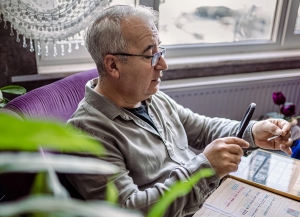Recently, one of our Everbrook Senior Living team members shared a unique encounter she had had while vacationing in southwest Florida. It’s a story we want to share in celebration of National Senior Citizens Day, which has been observed on August 21 every year since 1988 when then President Ronald Regan signed Proclamation 5847 to salute “older people have achieved much for our families, our communities, and our country… throughout their lives and for all they continue to accomplish…” as citizens of the United States.
Upon exiting the beach, she encountered a group of a dozen or so people surrounding an older woman who was telling stories from under the shower, rinsing sand from her silvery hair. She was so animated, it was impossible to just walk past. The 78-year-old shared stories of her youth: She was born in the Philippines and her family of origin hailed from Japan, Hawaii, and other island nations (places where she had lived as a girl and young woman). What caught our staff member’s attention was not only the way this spry older woman spoke about her history and her life now, but the rapt attention from the onlookers. There was a reverence and admiration for her as she spoke about:
Her “big collection of thousands of shark teeth” found while snorkeling off the coast. Of growing pineapples and tangerines in her backyard; of competing across Florida as a senior champion pickleball player. Of sharing hardships and adventures with her now 80-year-old husband “who I force to retire 15 years ago, or he work both of us to the grave!” Most days, she started her day “playing pickleball for 2 hours before the sun rose to bake the courts” then cooled-off in the Gulf of Mexico followed by bringing treats from her garden to the lifeguards. The rest of the day was for making time to mingle with tourists and locals around the beach town and “doing good deeds.” Fondly known as ‘Granny Kau’i’ (ka-OO-ey), she is living life true to the meaning of her Hawaiian name: ‘the youthful one.’
Thinking Differently About Aging
Kau’i is enjoying a ‘second youth’ in the prime of what we Americans typically refer to as the Golden Years. It’s a time in life that, as one astute teenager in the sandy-toed group observed, “Usually, people my age just ignore older people. Most older folks I know aren’t active like you. You don’t act old. You’ve made me think differently about what being older looks like and can be.” Many of the adults in the group, who hailed from various parts of the U.S., Europe, and Canada nodded agreement and shared similar sentiments.
Sadly, she’s right; phrases like “old man” and “granny” aren’t titles of respect and love in many societies. Instead, they conjure images of older adults who don’t engage much once careers come to an end. This can be for several reasons:
- Lack of preparation for how to use one’s retirement years can lead to getting stuck in simple, yet unfulfilling routine that is devoid of meaningful relationships, community engagement, or ways to feel useful and involved, such as sharing of skills and talents honed during employment.
- Chronic health problems derailing intended plans and an inability to pivot plans or find support for living life differently than anticipated.
- Age related mental decline, grief, and shrinking social outlets as friends and spouses pass on can lead to emotional health problems in the absence of proper supports.
Social & Cultural Factors Behind National Senior Citizen’s Day
Another crucial factor affecting how older adults function in society has to do with social and cultural biases on aging: what it means to grow older and to be a senior citizen. One of President Regan’s intentions with declaring National Senior Citizen’s Day was to combat such misperceptions of older adults and the aging process in our youth-centric American society.
Regan understood two things about aging and society:
- scientific data pointed to an exponential growth of the older adult population. By 2060, there will be about 95 million older adults in just the U.S., rapidly outpacing growth in any other age group.
- There were, and continue to be, stark differences in how Americans perceive old age compared to citizens of many other societies. Older adults are revered and appreciated in many other societies, such as Asian, Pacific Islander, Norwegian, Scandinavian and many parts of the Mediterranean.
National Senior Citizen Day served as a way to draw attention to these issues and to ensure that “our communities are good places in which to mature and grow older — places in which older people can participate to the fullest and can find the encouragement, acceptance, assistance, and services they need to continue to lead lives of independence and dignity.”
From this proclamation, came the growth of organizations, services, and living options (and more legislation) to address the evolving needs of older adults. Since 1988, many more older Americans, like Granny Kau’i, are able to live their best lives in ways that suit their interests, health status, financial resources, and personal preferences. This is the quality of living every older adult deserves and which we, at Everbrook Senior Living, devote ourselves to providing for our residents every day, 365 days a year.
Bringing the Best Solution to Seniors in Later Life.
From your first contact with one of our senior living advisors, you are considered family. We understand that every older adult has unique needs and our living arrangements, programs, and health services are intentionally designed to support those needs from active, independent living to various levels of assisted care.
Each of the Everbrook Senior Living communities is nestled within a community that affords residents the opportunity to take life at the pace they desire…
- Surrounded by the beauty of nature
- Opportunities to explore sites of historical, cultural, and social interest
- Year-round activities such as gardening, biking, walking, fitness, hobbies, and clubs
Points of interest within the local community, for exploring when family/grandkids visit
- Ability to travel locally or further afield with easy access to major airports and train stations
Everbrook Senior Living embraces the unique needs and qualities of each of our residents. We are involved in every aspect of the design of exceptional, elegant, and affordable residences. We offer first-in-class recreation and wellness programs that are backed by the latest research. And we have a carefully selected team of professionals who are devoted to older adults, seek to learn from them, and nurture their interests, personal needs, and sense of community.
At Everbrook, you live among like-minded peers, experience new adventures, and enjoy the simple luxuries of an active, independent ‘second youth’. Come see for yourself: schedule a visit, today.





